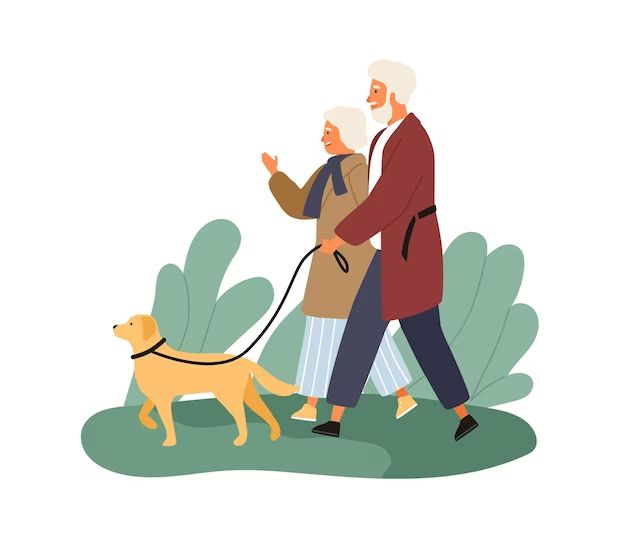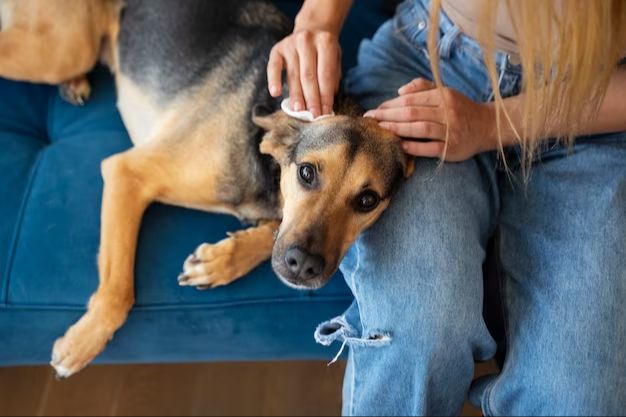Understanding Your Aging Pet’s Needs
As dogs age, their needs change. While keeping your dog mentally and physically stimulated remains important, you may need to adjust activities for their comfort and mobility. Focus on their quality of life by identifying what they still enjoy doing and modifying activities to match their current abilities. Manage pain and illness through veterinary care, medication, and natural supplements, to ensure they stay as active and comfortable as possible. Adjust their routine and environment to make their daily experiences positive and reduce stress. Food puzzles, gentle walks, time with family, or just a comfortable bed in their favorite sunny spot can go a long way in their golden years.

Working with Your Veterinarian

As your pet ages, regular checkups with your veterinarian become even more important. These visits allow your vet to monitor your pet’s overall health and wellbeing, and detect any changes or issues early on.
Be open with your vet about any concerns you notice with your aging pet – changes in behavior, activity levels, appetite, bathroom habits, mobility, and more. Keeping your vet informed helps them make adjustments to your pet’s care plan if needed.
Discuss your preferences for your pet’s end-of-life care with your vet. This includes your philosophy around euthanasia and quality of life assessments. Understanding your wishes allows your vet to guide and support you when tough decisions need to be made.
Don’t be afraid to ask questions. Your vet is there to help provide the best care for your pet. Ask about ways to keep your aging pet comfortable, supplements to consider, lifestyle adjustments, and anything else on your mind.
Providing Comfort Care at Home
As a pet owner, you want to ensure your aging companion stays as comfortable as possible. There are several ways to provide palliative care and increase quality of life in a pet’s final days:

Pet Hospice Care
Pet hospice mirrors human hospice in providing comfort care for terminally ill pets. Work with your vet to develop a plan that manages pain, provides nutritional support, gives mobility assistance, and addresses emotional needs. Hospice can take place at home or at a specialty provider.
Pain Management
It’s important to properly manage your pet’s pain and anxiety. Your vet can prescribe medication to keep your pet comfortable. Natural supplements, acupuncture, massage, or laser therapy may also help.
Mobility Aids
Products like ramps, harnesses, carts, or slings can help pets with limited mobility. Monitor for sores and irritation from mobility devices. Provide soft bedding and limit stairs.
Nutrition
Make adjustments to diet for dental issues or other conditions. Hand feed for reluctant eaters and provide favorites for appetite stimulation. Supplements can provide a nutritional boost.
In-Home Euthanasia
Many vets can provide at-home euthanasia so your pet can pass peacefully at home. Discuss options for final moments like favorite toys or blankets, family member attendance, and burial/cremation.
Preparing for Loss
Losing a beloved pet is one of the most difficult experiences for a pet owner. While nothing can eliminate the pain of this loss, thoughtful preparation and commemoration can provide comfort during the grieving process.

Consider putting together a memorial for your pet. This may involve creating a photo album or memory book, planting a memorial tree or garden, or holding a small ceremony. These acts help provide closure and a special way to say goodbye.
Take time to grieve in the way that feels right to you. There is no “right” way or length of time to grieve a pet. Let yourself fully experience and process the emotions that come.
Talk to family members, especially children, about the loss. Sharing feelings and memories can help start the healing process. Consider involving children in creating the pet memorial if interested.
Some find comfort in honoring their pet’s memory through donating to an animal shelter or rescue group. Volunteering with pets in need or adopting a shelter animal when ready can be very rewarding.
While losing a pet leaves an irreplaceable absence, cherishing the joy and companionship they brought can eventually help transform sadness into peace. With time and care, your broken heart will mend, even if always imprinted by their pawprint.